by Xinhua Writer Zhong Ya
BEIJING, May 18 (Xinhua) -- A famous saying by English poet George Herbert goes "One good mother is worth a hundred schoolmasters."
In the case of Ding Zheng, who was born with cerebral palsy in China's Hubei Province and is studying law at Harvard University, his mother Zou Hongyan is worth a thousand schoolmasters and more.
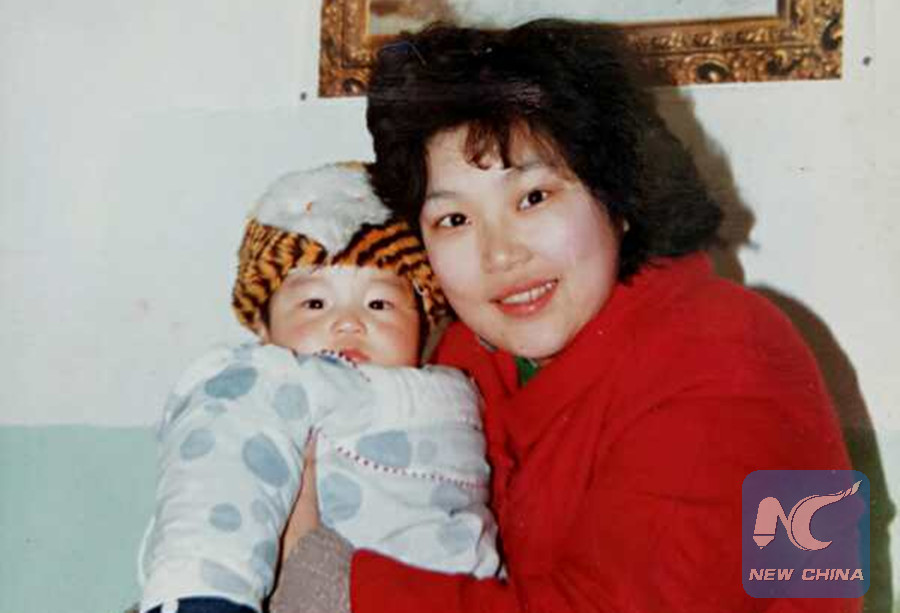
Zou Hongyan and Ding Zheng at home. (Courtesy of Zou Hongyan)
SAVING HER SON FROM DEATH AT THE COST OF DIVORCE
"There is little value in rescuing the baby. He will become mentally disabled or paralyzed. I suggest you give up," a doctor at Jingzhou District Hospital told Zou and her family on July 21, 1988.
Zou was shocked.
"We shall give up the baby. He will make our whole life miserable," her husband said. His "rational" words hurt Zou deeply.
On the fourth day after giving birth, Zou managed to go to the intensive care unit where her baby was, only to find him especially "quiet," neither crying nor even frowning after a nurse gave him injections of medicine.
The 25-year-old mother had suffered enough to give birth to the child. She had been carried home several times by her students after fainting during her pregnancy while teaching; she had forced herself out of the habit of sleeping late, and into one of reading poems for antenatal training in the early mornings; she had walked a long way to the market to buy fresh vegetables to provide better nutrition for the child in her womb, and she had forced herself to eat even while suffering from severe morning sickness.
But her child was in a life-threatening situation after suffering intrauterine hypoxia due to the medical negligence in Jingzhou City of Hubei Province on July 18, 1988, leaving her with the choices of either taking the baby off life support or keeping him on it, but probably ending up living a difficult life taking care of the physically-handicapped or even paralyzed boy.

Zou Hongyan and Ding Zheng at home. (Courtesy of Zou Hongyan)
"No! I shall not let my boy die! I felt so happy when his little feet gently kicked my abdomen, and his heart beat together with mine, like dancing a ballroom dance," Zou said.
"You are just too stubborn to listen to the doctor's advice. You will be the one to take care of the baby," said Zou's husband.
Yet Zou did not change her mind and started the long journey of rehabilitation training for Ding. Zou divorced her husband when Ding turned 10 due to their differences over whether to raise Ding.
SHOULDERING THE FAMILY'S BURDEN
"Of all the disabilities, I was most afraid that Ding Zheng would be mentally disabled," Zou recalled.
She started to take Ding to Hubei Provincial Hospital of Traditional Chinese Medicine to check his intelligence when he was less than 100 days old.
With continuous treatment, the day finally came when the doctor said Ding's intelligence level was normal after the boy turned one year of age.
"Nothing was more soothing than the news that my precious boy has normal intelligence," Zou told Xinhua.
However, due to damaged motor neurons in the cerebellum, Ding had great difficulties in sports: He could not hold things until the age of one; he learnt to stand at the age of two, walk at three and jump at six. Zou instilled perseverance into her son and never let him give up.
Ding needed massage treatment three times a week, costing five yuan (about 0.7 U.S. dollars) for each session. But Zou's salary as a teacher was just over 100 yuan (about 14.5 dollars) in the 1990s. There was no insurance covering Ding's rehabilitation.
The family was packed together into a room of less than 20 square meters. Whenever there was rain, basins and buckets were put on the bed to collect the rain drops.
In order to make a living and treat Ding's illness, Zou did many part-time jobs, including selling insurance after work for five years.
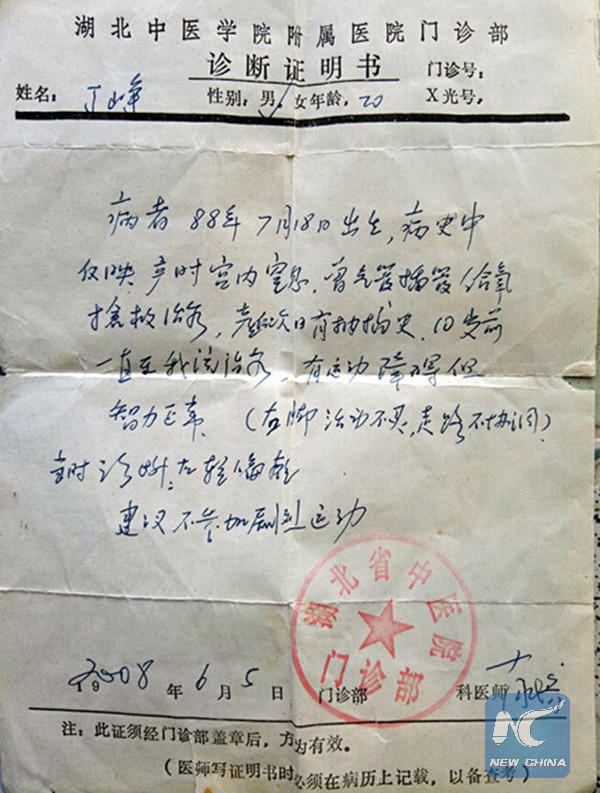
On June 5, 2008, Doctor Xiao Daiqi of Hubei Provincial Hospital of Traditional Chinese Medicine filed a medical certificate in Chinese, which reads that "The patient Ding Zheng, born on July 18, 1988, suffered intrauterine hypoxia at birth, and was rescued by inserting intubation into his weasands to provide oxygen. He had convulsions the second day after birth. He received treatment at our hospital before the age of ten. He has dyskinesia, with abnormal left foot and incoordinated walk gesture. But his intelligence is normal." (Courtesy of Zou Hongyan)
"I started to treat Ding Zheng when he was under one year old and was suffering from severe cerebral palsy. It was because his mother paid special attention to his illness, took him to our hospital for treatment at a very early age and continued his treatment non-stop for over ten years that he could recover to such a great extent. Early and continuous treatment for cerebral palsy patients is crucial," said 75-year-old Xiao Daiqi, who was a doctor at the department of pediatrics in Hubei Provincial Hospital of Traditional Chinese Medicine.
"Many hypoxic brain damage patients have low intelligence. I think, in Ding Zheng's case, his mother's unwavering support for early and continuous treatment for him played a key role in his recovery," the doctor told Xinhua.
"My mom has undergone huge hardships to bring me up. When I was young, once we encountered heavy snow when she carried me by bike to the hospital for massage treatment. Suddenly, the bike fell over into the mud. When my mom helped me up, the bike fell down; when she lifted the bike, I fell down. The moment we reached the hospital, both of us were covered with mud," said Ding, adding that even the doctor was moved by Zou's persistence.
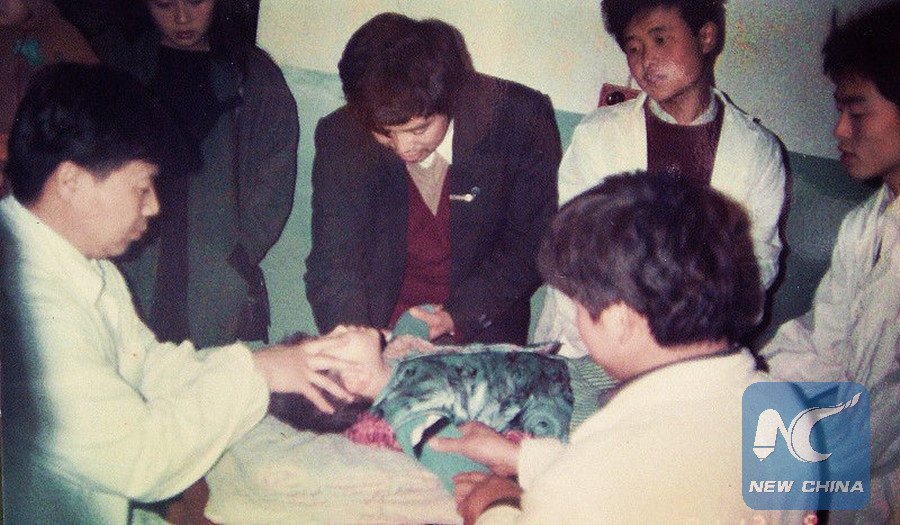
Ding Zheng was receiving Chinese massage treatment at Hubei Provincial Hospital of Traditional Chinese Medicine. (Courtesy of Zou Hongyan)
"If I took a day off in bad weather, what would happen if Ding Zheng or I got sick? Since I chose to rescue him 29 years ago, I tried my best to cure him of the illness," Zou said.
"The moments when my child stood up, walked and called me 'mommy' for the first time are the happiest in my life; it's like receiving a gift from heaven. I feel I'm a lucky mom," Zou said.
STRICT WITH HER SON
Some may say Zou shows her son a lot of "tough love."
Using chopsticks, a skill that comes naturally to most Chinese children, is a tremendously difficult task for Ding because of his illness. Many friends and neighbors persuaded Zou to allow Ding to quit.
"Using chopsticks is a must-do for Chinese people. If he is the only one who does not use chopsticks at the table, people will get curious. And then he has to explain to everybody that he has cerebral palsy, which will surely hurt his self-esteem," said Zou, under whose strict guidance for over a year, Ding finally learnt how to use chopsticks.
Zou tried everything she could to help Ding to overcome any obstacles his handicap had created.
"I don't want him to feel ashamed about his illness......I ask him to work harder than others and have higher requirements of him," said Zou.
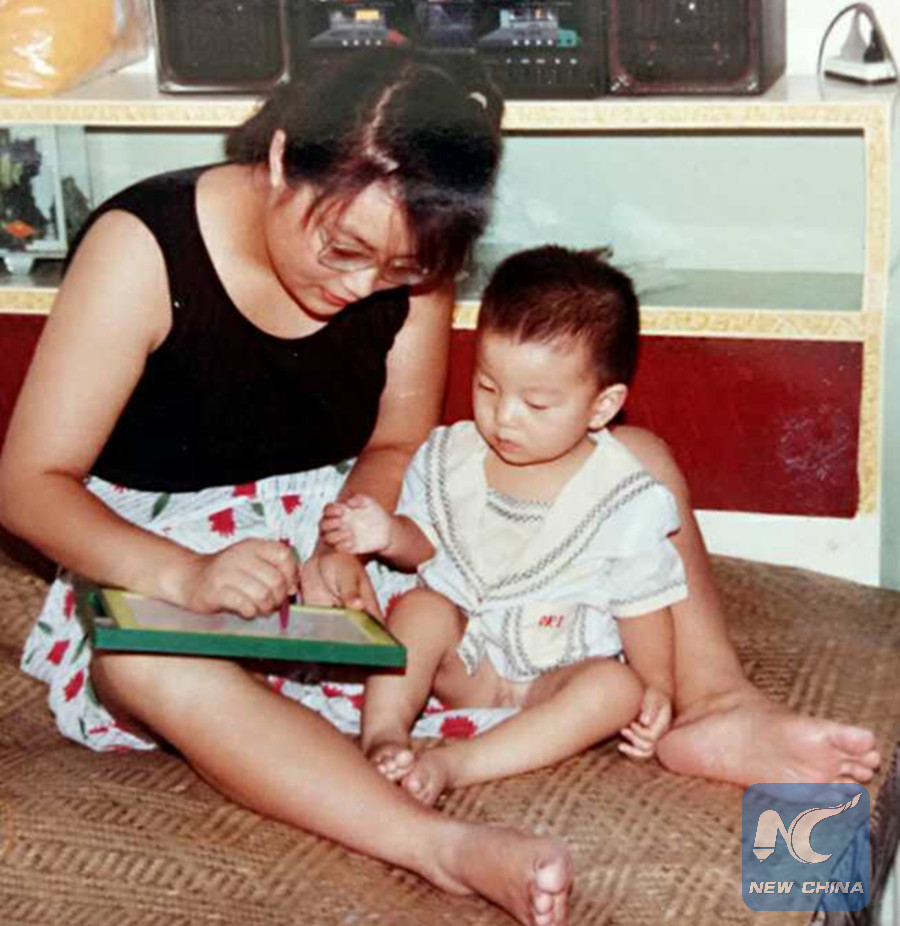
Zou Hongyan taught Ding Zheng to use pen. (Courtesy of Zou Hongyan)
Ding had difficulty holding a pen. So, Zou taught him to draw some shapes with thick-bodied pens by holding his hand, and then gradually changing to thin pens. Even though Ding was weak in his physical movements, he started learning how to read from his mother at the tender age of one, and he knew more than 100 Chinese characters before he was two years old.
But Zou neither helped Ding with his homework nor forced him to participate in training courses.
"My mom's catch-phrase is 'Don't ask me questions about your homework, I'm illiterate,' which I think is also a kind of educational concept," said Ding, adding that his mother was focusing on instilling good habits into him instead of helping him solve concrete difficulties.
MOM AS A MENTOR
Thanks to his mother's intense nurturing, Ding graduated from the College of Environmental Science and Engineering of Peking University, and then enrolled in the Law School of Peking University in the same year.

Zou attended Ding Zheng's graduation ceremony at Peking University. (Courtesy of Zou Hongyan)
In March 2016, Ding was admitted by the Law School of Harvard University after working as a lawyer for a year.
"I've never dared to apply for Harvard University, but my mom always encouraged me to give it a try. Whenever I hesitate, she is always there guiding me," said Ding.
In terms of educating children, Zou thinks parents should respect their children while at the same time being prepared to learn new things themselves.
Zou has always treated Ding as an equal and likes to discuss important decisions with him. Ding acknowledges that their treating each other as equals is the foundation of their healthy relationship.
"A lot of parents show strong ability and eloquence at work, while they turn bewildered when it comes to educating children, either spoiling the kids or lacking patience, failing to discuss with their kids in an equal and earnest way. My mom convinces me with arguments and stories when we have different opinions," said Ding.
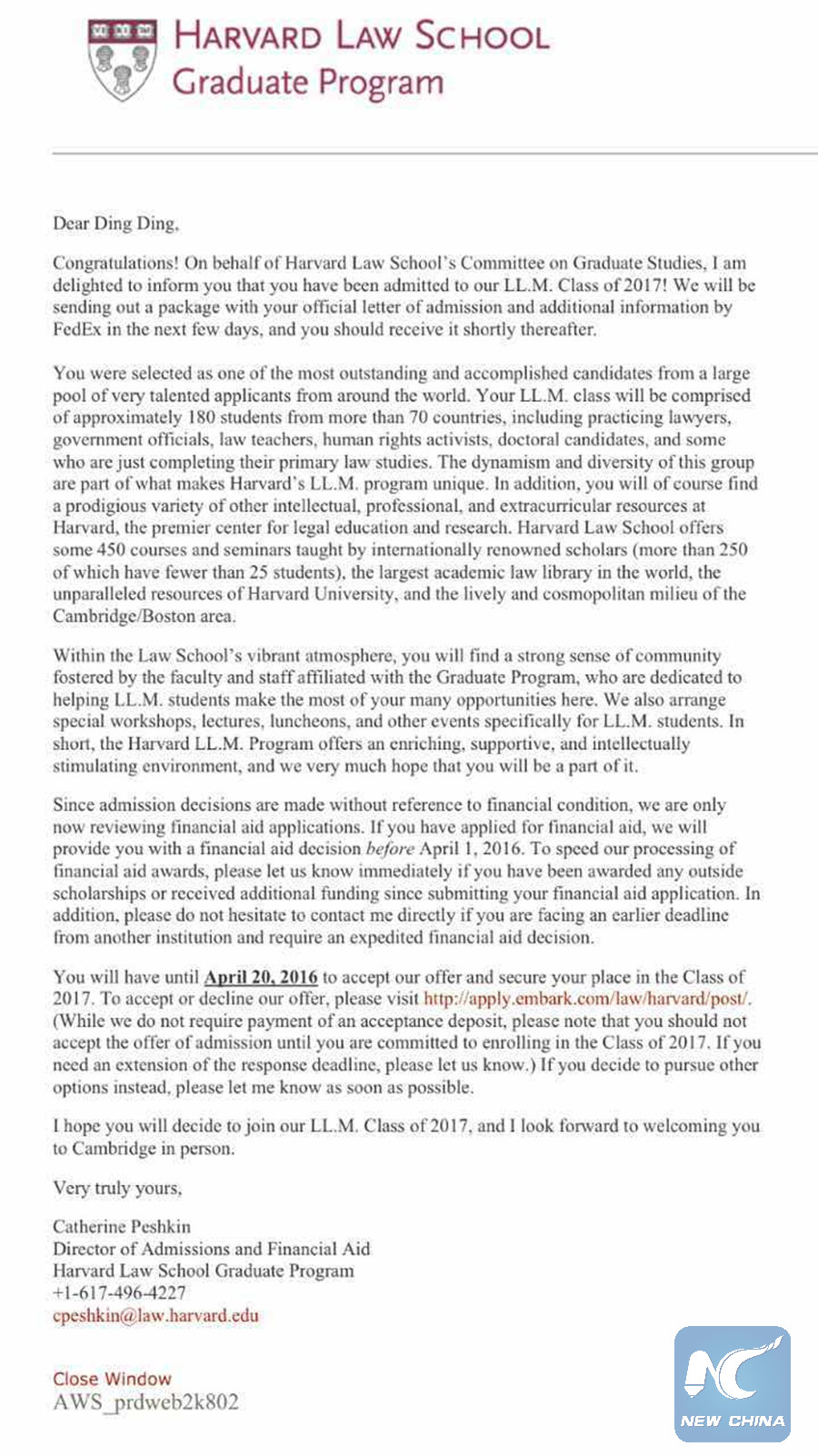
Ding Zheng's admission letter from Harvard Law School. (Courtesy of Ding Zheng)
"Ding Zheng's mother is one of the most patient parents I've ever seen, with so many methods to communicate with and enlighten her son. The boy showed a little bit of a strong personality and tended to stick to his own ideas. There were several small disagreements between us, and Zou would always help her son open up to me," Xie Yingshui, Ding's head teacher at Hubei Wuchang Experimental High School, told Xinhua.
In Ding's opinion, Zou is his mentor, while Zou regards herself as her son's sincere friend.
"I've never thought of myself as a great mother. I'm just a mother who would like to achieve continuous progress for her son," said Zou, adding that she would read books and prepare for any difficulties Ding might encounter whenever he entered a new school.
Even though Harvard University has provided financial aid accounting for three quarters of Ding's tuition fee, the remaining quarter poses a huge burden for this single-parent family.
"When I was a kid, I had been expecting to achieve some success when turning 30. Now, I'm 29, still financially relying on my mom. I want to work harder and make enough money to guarantee my mother a better life," Ding told Xinhua.
(Ren Weidong, Dong Yue, Li Changzheng and Liao Jun also contributed to the report.)

